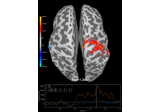mne.time_frequency.csd_tfr#
- mne.time_frequency.csd_tfr(epochs_tfr, tmin=None, tmax=None, picks=None, projs=None, verbose=None)[source]#
Compute covariance matrices across frequencies for TFR epochs.
- Parameters:
- epochs_tfr
EpochsTFR The time-frequency resolved epochs over which to compute the covariance.
- tmin
float|None Minimum time instant to consider, in seconds. If
Nonestart at first sample.- tmax
float|None Maximum time instant to consider, in seconds. If
Noneend at last sample.- picks
str| array_like |slice|None Channels to include. Slices and lists of integers will be interpreted as channel indices. In lists, channel type strings (e.g.,
['meg', 'eeg']) will pick channels of those types, channel name strings (e.g.,['MEG0111', 'MEG2623']will pick the given channels. Can also be the string values'all'to pick all channels, or'data'to pick data channels. None (default) will pick good data channels (excluding reference MEG channels). Note that channels ininfo['bads']will be included if their names or indices are explicitly provided.- projs
listofProjection|None List of projectors to store in the CSD object. Defaults to
None, which means the projectors defined in the EpochsTFR object will be copied.- verbosebool |
str|int|None Control verbosity of the logging output. If
None, use the default verbosity level. See the logging documentation andmne.verbose()for details. Should only be passed as a keyword argument.
- epochs_tfr
- Returns:
- resinstance of
CrossSpectralDensity Cross-spectral density restricted to selected channels.
- resinstance of
Examples using mne.time_frequency.csd_tfr#

Compute source level time-frequency timecourses using a DICS beamformer